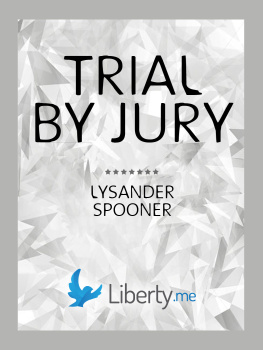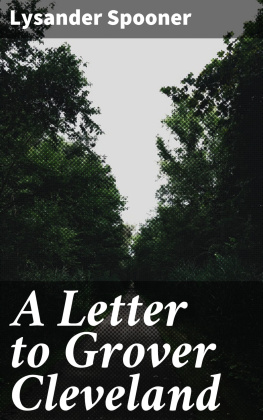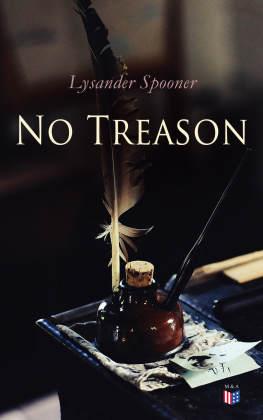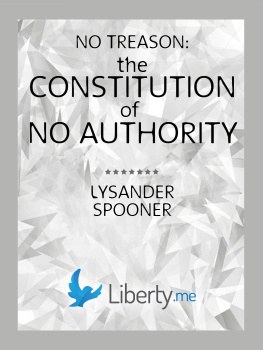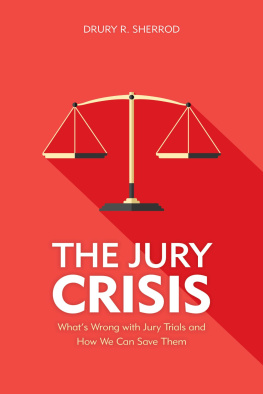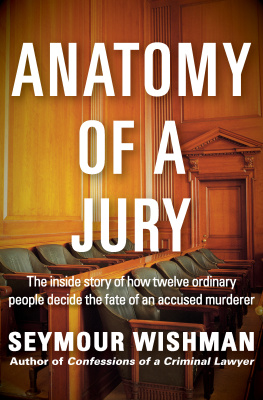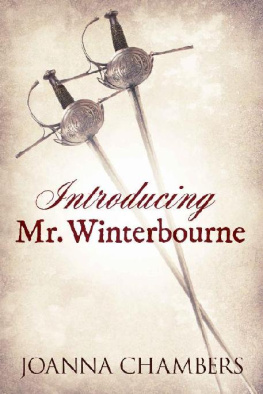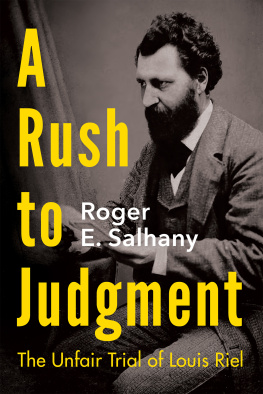Lysander Spooner - Trial by Jury
Here you can read online Lysander Spooner - Trial by Jury full text of the book (entire story) in english for free. Download pdf and epub, get meaning, cover and reviews about this ebook. year: 2013, publisher: Liberty.me, genre: Romance novel. Description of the work, (preface) as well as reviews are available. Best literature library LitArk.com created for fans of good reading and offers a wide selection of genres:
Romance novel
Science fiction
Adventure
Detective
Science
History
Home and family
Prose
Art
Politics
Computer
Non-fiction
Religion
Business
Children
Humor
Choose a favorite category and find really read worthwhile books. Enjoy immersion in the world of imagination, feel the emotions of the characters or learn something new for yourself, make an fascinating discovery.
- Book:Trial by Jury
- Author:
- Publisher:Liberty.me
- Genre:
- Year:2013
- Rating:3 / 5
- Favourites:Add to favourites
- Your mark:
- 60
- 1
- 2
- 3
- 4
- 5
Trial by Jury: summary, description and annotation
We offer to read an annotation, description, summary or preface (depends on what the author of the book "Trial by Jury" wrote himself). If you haven't found the necessary information about the book — write in the comments, we will try to find it.
Trial by Jury — read online for free the complete book (whole text) full work
Below is the text of the book, divided by pages. System saving the place of the last page read, allows you to conveniently read the book "Trial by Jury" online for free, without having to search again every time where you left off. Put a bookmark, and you can go to the page where you finished reading at any time.
Font size:
Interval:
Bookmark:
For more than six hundred yearsthat is, since Magna Carta, in 1215there has been no clearer principle of English or American constitutional law, than that, in criminal cases, it is not only the right and duty of juries to judge what are the facts, what is the law, and what was the moral intent of the accused; but that it is also their right, and their primary and paramount duty, to judge of the justice of the law, and to hold all laws invalid, that are, in their opinion, unjust or oppressive, and all persons guiltless in violating, or resisting the execution of such laws.
Unless such be the right and duty of jurors, it is plain that, instead of juries being a palladium of libertya barrier against the tyranny and oppression of the governmentthey are really mere tools in its hands, for carrying into execution any injustice and oppression it may desire to have executed.
But for their right to judge of the law, and the justice of the law, juries would be no protection to an accused person, even as to matters of fact; for, if the government can dictate to a jury any law whatever, in a criminal case, it can certainly dictate to them the laws of evidence. That is, it can dictate what evidence is admissible, and what inadmissible, and also what force or weight is to be given to the evidence admitted. And if the government can thus dictate to a jury the laws of evidence, it can not only make it necessary for them to convict on a partial exhibition of the evidence rightfully pertaining to the case, but it can even require them to convict on any evidence whatever that it pleases to offer them.
That the rights and duties of jurors must necessarily be such as are here claimed for them, will be evident when it is considered what the trial by jury is, and what is its object.
The trial by jury, then, is a trial by the countrythat is, by the peopleas distinguished from a trial by the government.
It was anciently called trial per paisthat is, trial by the country. And now, in every criminal trial, the jury are told that the accused has, for trial, put himself upon the country; which country you (the jury) are.
The object of this trial by the country, or by the people, in preference to a trial by the government, is to guard against every species of oppression by the government. In order to effect this end, it is indispensable that the people, or the country, judge of and determine their own liberties against the government; instead of the governments judging of and determining its own powers over the people. How is it possible that juries can do anything to protect the liberties of the people against the government, if they are not allowed to determine what those liberties are?
Any government, that is its own judge of, and determines authoritatively for the people, what are its own powers over the people, is an absolute government of course. It has all the powers that it chooses to exercise. There is no otheror at least no more accuratedefinition of a despotism than this.
On the other hand, any people, that judge of, and determine authoritatively for the government, what are their own liberties against the government, of course retain all the liberties they wish to enjoy. And this is freedom. At least, it is freedom to them; because, although it may be theoretically imperfect, it, nevertheless, corresponds to their highest notions of freedom.
To secure this right of the people to judge of their own liberties against the government, the jurors are taken, (or must be, to make them lawful jurors,) from the body of the people, by lot, or by some process that precludes any previous knowledge, choice, or selection of them, on the part of the government. This is done to prevent the governments constituting a jury of its own partisans or friends; in other words, to prevent the governments packing a jury, with a view to maintain its own laws, and accomplish its own purposes.
It is supposed that, if twelve men be taken, by lot, from the mass of the people, without the possibility of any previous knowledge, choice, or selection of them, on the part of the government, the jury will be a fair epitome of the country at large, and not merely of the party or faction that sustain the measures of the government; that substantially all classes of opinions, prevailing among the people, will be represented in the jury; and especially that the opponents of the government, (if the government have any opponents,) will be represented there, as well as its friends; that the classes, who are oppressed by the laws of the government, (if any are thus oppressed,) will have their representatives in the jury, as well as those classes, who take sides with the oppressorthat is, with the government.
It is fairly presumable that such a tribunal will agree to no conviction except such as substantially the whole country would agree to, if they were present, taking part in the trial. A trial by such a tribunal is, therefore, in effect, a trial by the country. In its results it probably comes as near to a trial by the whole country, as any trial that it is practicable to have, without too great inconvenience and expense. And as unanimity is required for a conviction, it follows that no one can be convicted, except for the violation of such laws as substantially the whole country wish to have maintained. The government can enforce none of its laws, (by punishing offenders, through the verdicts of juries,) except such as substantially the whole people wish to have enforced. The government, therefore, consistently with the trial by jury, can exercise no powers over the people, (or, what is the same thing, over the accused person, who represents the rights of the people,) except such as substantially the whole people of the country consent that it may exercise. In such a trial, therefore, the country, or the people, judge of and determine their own liberties against the government, instead of the governments judging of and determining its own powers over the people.
But all this trial by the country would be no trial at all by the country, but only a trial by the government, if the government could either declare who may, and who may not, be jurors, or could dictate to the jury anything whatever, either of law or evidence, that is of the essence of the trial.
If the government may decide who may, and who may not, be jurors, it will of course select only its partisans, and those friendly to its measures. It may not only prescribe who may, and who may not, be eligible to be drawn as jurors; but it may also question each person drawn as a juror, as to his sentiments in regard to the particular law involved in each trial, before suffering him to be sworn on the panel; and exclude him if he be found unfavorable to the maintenance of such a law.
So, also, if the government may dictate to the jury what laws they are to enforce, it is no longer a trial by the country,
but a trial by the government; because the jury then try the accused, not by any standard of their ownnot by their own judgments of their rightful libertiesbut by a standard dictated to them by the government. And the standard, thus dictated by the government, becomes the measure of the peoples liberties. If the government dictate the standard of trial, it of course dictates the results of the trial. And such a trial is no trial by the country, but only a trial by the government; and in it the government determines what are its own powers over the people, instead of the peoples determining what are their own liberties against the government. In short, if the jury have no right to judge of the justice of a law of the government, they plainly can do nothing to protect the people against the oppressions of the government; for there are no oppressions which the government may not authorize by law.
Font size:
Interval:
Bookmark:
Similar books «Trial by Jury»
Look at similar books to Trial by Jury. We have selected literature similar in name and meaning in the hope of providing readers with more options to find new, interesting, not yet read works.
Discussion, reviews of the book Trial by Jury and just readers' own opinions. Leave your comments, write what you think about the work, its meaning or the main characters. Specify what exactly you liked and what you didn't like, and why you think so.

